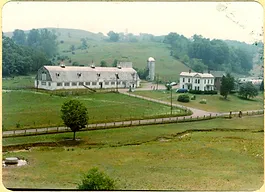

For more than 50 years, the community-based system of alcohol, drug addiction and mental health services has given help and hope to millions of our most vulnerable citizens.
In the 1960s, the states, faced with a crisis of insufficient resources, large numbers of patients, the development of new medications, the demands for individualized treatment and the call for patients’ rights, looked to their communities for the solution–and communities accepted the difficult challenge with a remarkable and enduring sense of commitment.
A series of federal and state laws were introduced which provided the foundation for Ohio’s modern community-based system of care. In 1963, Congress passed the Community Mental Health Centers Act, which established community mental health agencies to provide outpatient counseling and crisis intervention for people living in the community.
In 1967, Ohio enacted Amended Substitute House Bill (ASHB) 648, creating 53 Community Mental Health and Mental Retardation Boards, known as “648 Boards.” These Boards became the local managers of federal and state moneys, earmarked for the planning and delivery of community-based mental health services. At the same time, Amended Substitute Senate Bill (ASSB) 169 established 88 county Boards of Mental Retardation, known as “169 Boards,” charged with the responsibility for the care and education of individuals with mental retardation.
In this area, a four-county Board—consisting of Athens, Hocking, Vinton and Washington Counties—was organized to meet federal and state requirements. Originally located in the basement of the Athens Sheriff’s Office, the Board moved to larger space in the Athens Mental Health Center in 1976. At the same time, Washington County was finding the travel distance too burdensome to maintain the close contacts necessary for effective Board operations, and in 1977 it was mutually agreed that Washington County would form a separate Board.
Also in 1977, the three-county Board was able to acquire its own facility at the former residents’ dormitory adjacent to the Athens Mental Health Center’s dairy barn. In 1980, passage of ASSB 160 transferred responsibilities for mentally retarded clients to 169 Boards and changed the name of 648 Boards to Community Mental Health Boards.
In a move to integrate a system of care, both hospital and community-based, the Mental Health Act of 1988 gradually shifted inpatient funds to local Boards to provide mental health and those recovery services essential for community living, including housing, case management and transportation.
Another change in board responsibilities quickly followed in 1989 with ASHB 317, the Alcohol and Drug Addiction Services Act, which established the Ohio Department of Alcohol and Drug Addiction Services and added the responsibility for alcohol and drug addiction prevention and treatment services to local Boards. Thus, “648 Boards” became “317 Boards.”
Today, the 317 Board creates a network of individualized care for people who need prevention and treatment for mental illness and/or alcohol and drug addiction. Our role remains the same: to design policies, evaluate programs, access funds and monitor services to ensure quality care, and always to remember that the client comes first.
Seldom has any system in our country been forced to adapt to so many significant changes in such rapid succession. The fact that Ohio’s local board system was able to accomplish this, while keeping the interests of those it serves as its primary objective, is testimony to the abiding determination of people throughout the system to provide the highest quality care possible. Locally, evidence of this commitment can be seen in the number of levies passed to support mental health and substance abuse services in Athens, Hocking and Vinton Counties.
During this time of change, three out of four patients in Ohio’s psychiatric hospitals were released into the care of their communities. In 1993, the Athens Mental Health Center moved from its large and outdated facility on the ridge overlooking Athens to a new, smaller and more efficient facility for adult inpatient care, Southeast Psychiatric Hospital (SPH).
The 21 acres comprising the mental health center and grounds were transferred to Ohio University, which is renovating and adapting selected buildings for its use. SPH merged with the Cambridge Psychiatric Hospital in 1996 to form the Appalachian Psychiatric Healthcare System.
In 2001, to conform to the state’s updated terminology, the hospital’s name was changed to Appalachian Behavioral Healthcare (ABH). In 1990, the state hospital had 220 beds for patients. Today that number has dropped to 40 beds, with the average length of stay around 14 days. ABH, with its comprehensive inpatient services, plays a strong role in the continuum of care for community-based clients.
In Athens, Hocking and Vinton Counties, intensive case management, housing and community support programs, funded through the 317 Board, continue to provide services which improve patients’ transitions from hospital-based to community-based care.
We are careful stewards of tax dollars, ever mindful of our responsibility to maintain the highest standards of accountability, while safeguarding the quality of services we fund. Our voters have demonstrated their appreciation for our high-quality services, public accountability and effective management by their continued support of our levies. We will continue to meet their expectations.
We were instrumental in the development of a Treatment Alternatives to Street Crime (TASC) program in Athens, Hocking and Vinton Counties, both adult and juvenile. The programs seek to improve offender compliance with treatment, improve treatment outcomes and reduce the recurrence of criminal activity.
We continue to build strong partnerships with our Departments of Job and Family Services, courts, schools, law enforcement officials and other social service agencies. By sharing resources and responsibilities we have established a safety net for people in need in our communities.
The Board continues to be at the forefront of new technological developments, employing cutting edge computer and information management systems to better serve our contract agencies and clients, and provide greater accountability. We actively integrate appropriate managed care practices throughout our network to prepare for the constant changes in healthcare delivery, but maintain our pledge to our citizens to provide them with quality services.
The best security we have for the future of our providing care is built upon the foundation set so many years ago, and our willingness to grasp and guide the future. We will continue our tradition of flexibility during times of change, our unceasing commitments to the best possible client care, our willingness to embrace new technologies and ideas. The continued support of our levies highly demonstrates our community’s commitment to our most vulnerable citizens.
